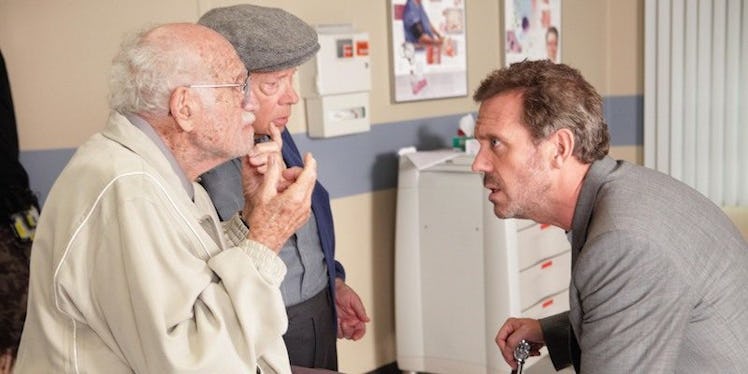
5 Things You Need To Know About Alzheimer's No Matter How Old You Are
Alzheimer’s disease isn’t exactly an appropriate topic for dinner conversation, and it certainly doesn't make for good for small talk.
In fact, there’s almost never a good time to talk about Alzheimer’s disease, except for now.
June was named Alzheimer’s and Brain Awareness Month so people, no matter their ages, can understand how Alzheimer's could affect their lives.
Last year, I worked on a dementia research project, and I realized most people don’t know about Alzheimer’s.
So, here are five things you should know about the disease and what it could mean for you:
1. Alzheimer’s disease is much more prevalent than you think.
Alzheimer's disease is daunting. There is no cure, no clear cause and no way to slow it down. It’s also the sixth leading cause of death in the United States.
It’s the most common form of dementia, and it's projected to be one of the fastest-growing diseases in the world.
That may sound exaggerated, but it's only because the diagnosis rate is relatively low for Alzheimer's disease.
Compared to the 90 percent diagnosis rate for people with a common type of cancer, only 45 percent of people who have Alzheimer's disease are diagnosed.
Two-thirds of Alzheimer’s patients are women because women live longer, and the risk of getting Alzheimer's disease increases with age.
It’s been found that older African-Americans and Hispanics are also more likely to get the disease.
For 20-somethings, the threat of Alzheimer's is real. Early-onset Alzheimer’s can affect people as young as 30 years old.
Approximately 200,000 people in the United States have it, and that number is also expected to increase.
By 2025, the number of people with Alzheimer's disease (age 65 and over) is expected to increase by 40 percent.
By 2050, figures are expected to almost triple. All things considered, the numbers don’t paint a pretty picture, which is why understanding Alzheimer’s disease now is extremely important.
2. It’s not a normal part of aging, and there are other risk factors involved.
We’ve all missed an appointment or lost our keys when we were having a hectic week.
Forgetfulness like this can happen more and more as we get older.
But, the memory loss experienced in Alzheimer’s disease is not like that.
Some patients forget more than names and dates, and they lose their language abilities, motor skills and their senses of time and place.
Patients also lose their sense of direction, coordination and logic, and they are unable to do things like drive, use a knife and fork or maintain a conversation.
They lose more than their memories of the past; they lose their grasp on the present.
Although older people are at higher risk for the disease, it’s not a natural consequence of aging.
However, it may be a consequence of a family history of dementia or head trauma.
The disease may also be linked to your cardiovascular health, and diseases like diabetes or high blood pressure might put you at risk.
3. Caring for an Alzheimer’s patient is very challenging.
One in three seniors dies with Alzheimer’s disease.
With the projected rise over the next few years, there’s a good chance you’ll be faced with caring for a loved one with Alzheimer’s disease in the future.
It's a very difficult illness for families to cope with because of its degenerative nature.
It can also be frustrating to deal with with the mood swings or unpredictable behavior of an Alzheimer's patient.
With a skewed sense of place or time, many patients persist in a confused state.
Others may get violent as a way to defend themselves against people they cannot recognize. It can be overwhelming.
Many families are forced to hire private care for their parents or grandparents because they are not equipped to manage by themselves.
4. If you’re a caregiver, help is available.
Your local Alzheimer’s Association or mental health clinic can help you choose a facility.
Ask facility managers if the staff is trained in dealing with dementia patients.
Depending on your geographic location and financial status, finding care may be a difficult journey, but you’re not alone.
Seek out Alzheimer’s support groups to meet and learn from families who are going through the same things you are, and ask for care home recommendations.
Seek professional counseling to help deal with the stress and sadness of losing your loved one to the disease.
Take time off from the situation to work through your own thoughts and feelings.
Reach out to friends who may have had similar experiences.
In addition to medication, look into specialists who offer music and art therapy to reduce stress and maintain brain activity in Alzheimer’s patients.
5. Alzheimer’s is only one type of dementia.
Our brains are at risk for different kinds of dementia. It’s important to be aware of these to help protect our brains.
For instance, if you’re at risk for a stroke, you may also be at risk for vascular dementia.
People with Parkinson's disease are also at risk for developing dementia with Lewy bodies.
For all kinds of dementia, there is a clear link between our physical health and our brain health.
Poor diets, smoking, excessive drinking, stress and heart problems all increase the risk of dementia in one form or another.
So, take heed and remember a healthy body increases your chances of a healthy brain.
During this month of awareness, take the opportunity to learn more by supporting your local Alzheimer’s Association chapter or memory clinic.
Contribute to fundraisers or participate in walkathons and other events.
Learn about the early warning signs of brain impairment and talk about it with your family and friends.
Helping to reduce the stigma and discomfort around brain health will go a long way in the fight against Alzheimer’s.